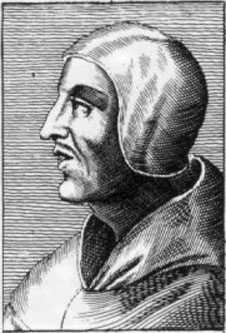| John Duns Scotus  Born: c. 1265 Born: c. 1265
Birthplace: Duns, Lothian, Scotland
Died: 8-Nov-1308
Location of death: Cologne, Germany
Cause of death: Stroke
Gender: Male
Religion: Roman Catholic
Race or Ethnicity: White
Occupation: Religion, Philosopher, Scholar Nationality: Scotland
Executive summary: 14th century Scottish scholar John Duns Scotus, born 1265 or 1275-1308, is one of the foremost of the schoolmen. His birthplace has been variously given as Duns in Berwickshire, Dunum (Down) in Ulster, and Dunstane in Northumberland, but there is not sufficient evidence to settle the question. He joined the Franciscan order in early life, and studied at Merton College, Oxford, of which he is said to have been a fellow. He became remarkably proficient in all branches of learning, but especially in mathematics. When his master, William Varron, removed to Paris in 1301, Duns Scotus was appointed to succeed him as professor of philosophy, and his lectures attracted an immense number of students. Probably in 1304 he went to Paris, in 1307 he received his doctors degree from the university, and in the same year was appointed regent of the theological school.
Duns' connection with the university was made memorable by his defense of the doctrine of the Immaculate Conception, in which he displayed such dialectical ingenuity as to win for himself the title Doctor Subtilis. The doctrine long continued to be one of the main subjects in dispute between the Scotists and the Thomists, or, what is almost the same thing, between the Franciscans and the Dominicans. The university of Paris was so impressed by his arguments, that in 1387 it formally condemned the Thomist doctrine, and a century afterwards required all who received the doctors degree to bind themselves by an oath to defend the doctrine of the Immaculate Conception. In 1308 Duns Scotus was sent by the general of his order to Cologne, with the twofold object of engaging in a controversy with the Beghards and of assisting in the foundation of a university; according to some, his removal was due to jealousy. He was received with enthusiasm by the inhabitants but died suddenly (it was said, of apoplexy) on the 8th of November in the same year. There was also a tradition that he had been buried alive.
His philosophical position was determined, or at least very greatly influenced, by the antagonism between the Dominicans and the Franciscans. Further, while the genius of St. Thomas Aquinas was constructive, that of Duns Scotus was destructive; Aquinas was a philosopher, Duns a critic. The latter has been said to stand to the former in the relation of Immanuel Kant to Gottfried Leibniz. In the matter of Universals, Duns was more of a realist and less of an eclectic than Aquinas. Theologically, the Thomistic system approximates to pantheism, while that of Scotus inclines distinctly to Pelagianism. The doctrine of the Immaculate Conception was the great subject in dispute between the two parties; it was strenuously opposed by Aquinas, and supported by Duns Scotus, although not without reserve.
There were, however, differences of a wider and deeper kind. In opposition to Aquinas, who maintained that reason and revelation were two independent sources of knowledge, Duns Scotus held that there was no true knowledge of anything knowable apart from theology as based upon revelation. In conformity with this principle he denied that the existence of God was capable of being proved, or that the nature of God was capable of being comprehended. He therefore rejected as worthless the ontological proof offered by Aquinas. Another chief point of difference with Aquinas was in regard to the freedom of the will, which Duns Scotus maintained absolutely. He reconciled free will and necessity by representing the divine decree not as temporarily antecedent, but as immediately related to the action of the created will. He maintained, in opposition to Aquinas, that the will was independent of the understanding, that only will could affect will. From this difference as to the nature of free will followed by necessary consequence a difference with the Thomists as to the operation of divine grace. In ethics the distinction he drew between natural and theological virtues is common to him with the rest of the schoolmen. Duns Scotus strongly upheld the authority of the church, making it the ultimate authority on which that of Scripture depends.
The most important of his works consisted of questions and commentaries on the writings of Aristotle, and on the Sentences of Lombard, the so-called Opus Oxoniense or Anglicanum. Complete works, edited by Luke Wadding (13 vols., Lyons, 1639) and at Paris (26 vols., 1891-95). There is an edition of his De modis significandi or Grammatica speculativa, the first attempt to investigate the general laws of language, by F. M. Fernández García (Quaracchi, Florence, 1902). University: Merton College, Oxford University
Do you know something we don't?
Submit a correction or make a comment about this profile
Copyright ©2019 Soylent Communications
|